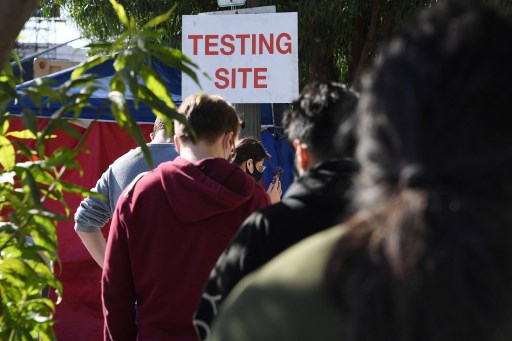
Shortly before 1400 GMT on November 9, 2020 the tracker by the Baltimore-based university showed 10,018,278 cases recorded in the US since the pandemic began, and 237,742 deaths. Both are the highest tolls in absolute terms in the world. (Photo by Robyn Beck / AFP)
WASHINGTON, United (AFP) — The US Food and Drug Administration on Monday granted emergency approval to a synthetic antibody treatment against Covid-19 developed by Eli Lilly, after the drug was shown to reduce the risk of hospitalization and emergency room visits.
Bamlanivimab at a dose of 700 milligrams was authorized for the treatment of mild-to-moderate Covid-19 in adults and children aged 12 years and older who are at high risk for progressing to the severe form of the disease.
It is the first major drug to be approved that was designed specifically against the new coronavirus.
“As illustrated by today’s action, the FDA remains committed to expediting the development and availability of potential COVID-19 treatments,” said the agency’s chief Stephen Hahn.
The approval was based on a mid-stage clinical trial for outpatients with mild to moderate Covid-19, where the intravenous treatment was shown to reduce viral loads and rates of symptoms and hospitalization.
The FDA said in its statement that the most important evidence that bamlanivimab may be effective came from data that showed that among patients at high risk of severe disease, hospitalizations and emergency room visits occurred in 3 percent of bamlanivimab-treated patients compared to 10 percent who were on the placebo.
The frequency and types of side effects were similar between bamlanivimab and placebo, with the majority being mild to moderate in severity.
The most common were diarrhea, dizziness, headache, itchiness and vomiting.
The trial is ongoing and aims to enroll more than 800 patients across various dosage groups.
An important caveat is that bamlanivimab has not been authorized for patients who are hospitalized — since no benefit has been shown for patients who are already in this late stage of the disease, when the body’s immune defenses go into overdrive and damage organs.
The FDA wrote that administering the drug too late could be associated with worse outcomes, and a trial exploring bamlanivimab in hospitalized patients was suspended last month over a safety incident.
Bamlanivimab is what’s known as a monoclonal antibody, a relatively new class of drugs that are best known for treating certain types of cancer and autoimmune disease.
Human immune systems produce antibodies, which are infection-fighting proteins, and vaccines teach our bodies to be prepared to make the right ones for particular pathogens.
Bamlanivimab was based on an effective antibody Lilly found in a recovered patient.
The host immune cells that produce the antibodies can be cultured in a lab to produce the desired proteins en masse.
It works by binding to a surface protein of the coronavirus to stop it from invading human cells.
© Agence France-Presse







